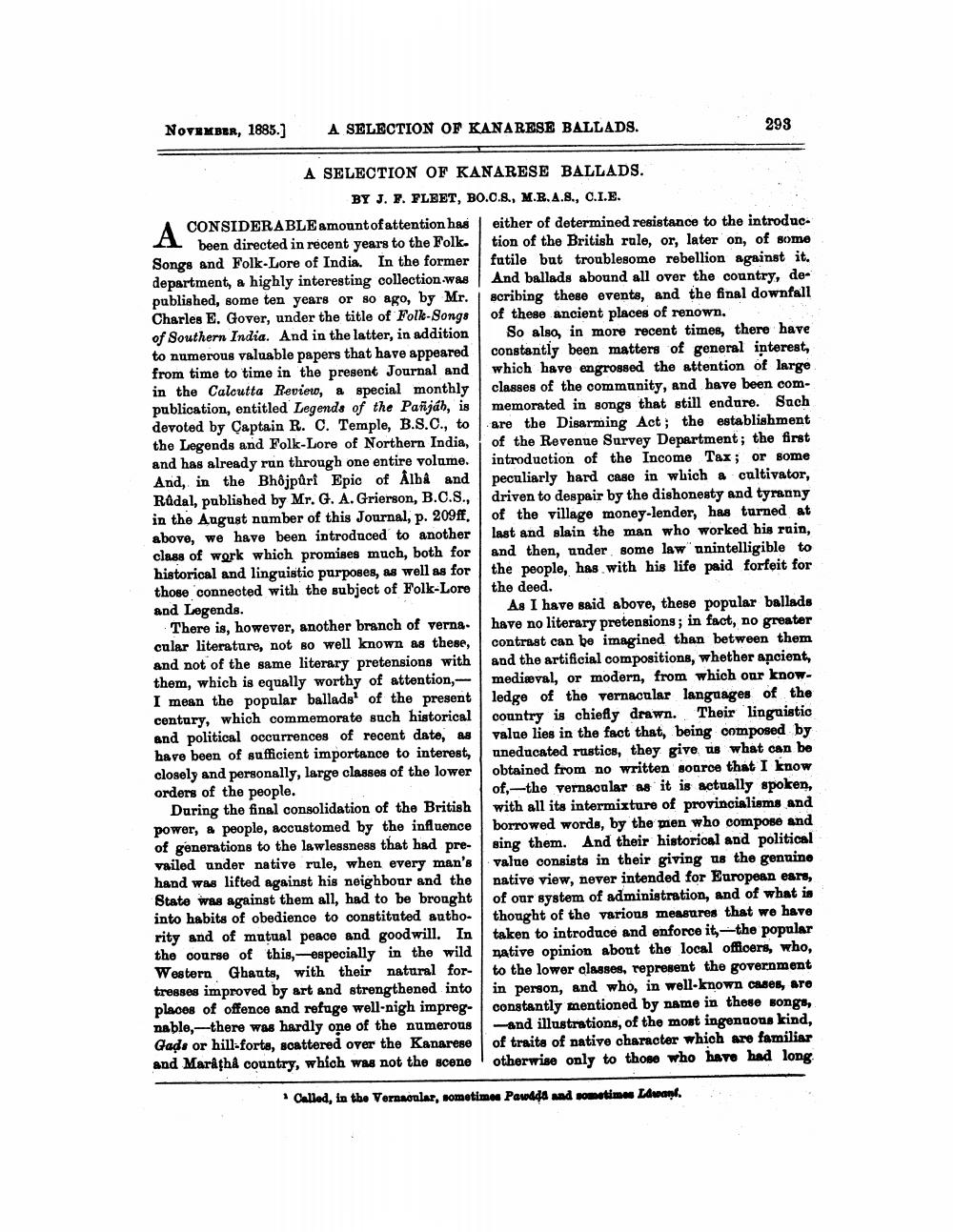________________
November, 1885.)
A SELECTION OF KANARESE BALLADS.
293
A SELECTION OF KANARESE BALLADS.
BY J. F. PLEET, BO.C.S., M.E.A.., C.I.E. CONSIDERABLE amount of attention has either of determined resistance to the introduc
been directed in recent years to the Folk. tion of the British rule, or, later on, of some Songs and Folk-Lore of India. In the former futile but troublesome rebellion against it. department, a highly interesting collection was And ballads abound all over the country, depublished, some ten years or so ago, by Mr. scribing these events, and the final downfall Charles E. Gover, under the title of Folk Songs of these ancient places of renown. of Southern India. And in the latter, in addition So also, in more recent times, there have to numerous valuable papers that have appeared constantly been matters of general interest, from time to time in the present Journal and which have engrossed the attention of large in the Calcutta Review, a special monthly classes of the community, and have been compublication, entitled Legends of the Pañjáb, is memorated in songs that still endure. Such devoted by Captain R. C. Temple, B.S.C., to are the Disarming Act; the establishment the Legends and Folk-Lore of Northern India, of the Revenue Survey Department; the first and has already run through one entire volume. introduction of the Income Tax; or some And, in the Bhojpuri Epic of Albê and peculiarly hard case in which a cultivator, Rådal, published by Mr. G. A. Grierson, B.C.S., driven to despair by the dishonesty and tyranny in the August number of this Journal, p. 209ff. of the village money-lender, has turned at above, we have been introduced to another last and slain the man who worked his rain, class of work which promises much, both for and then, under some law unintelligible to historical and linguistic purposes, as well as for the people, has with his life paid forfeit for those connected with the subject of Folk-Lore the deed. and Legends.
As I have said above, these popular ballads There is, however, another branch of verne have no literary pretensions; in fact, no greater cular literature, not so well known as these, contrast can be imagined than between them and not of the same literary pretensions with and the artificial compositions, whether ancient, them, which is equally worthy of attention, mediæval, or modern, from which our knowI mean the popular ballads' of the present ledge of the vernacular languages of the century, which commemorate such historical country is chiefly drawn. Their linguistic and political occurrences of recent date, as value lies in the fact that, being composed by have been of sufficient importance to interest, uneducated rustics, they give us what can be closely and personally, large classes of the lower obtained from no written source that I know orders of the people.
of,--the vernacular as it is actually spoken, During the final consolidation of the British with all its intermixture of provincialisms and power, a people, accustomed by the influence borrowed words, by the men who compose and of generations to the lawlessness that had pre- sing them. And their historical and political vailed under native rule, when every man's value consists in their giving us the gentino hand was lifted against his neighbour and the native view, never intended for European ears, State was against them all, had to be brought of our system of administration, and of what is into habits of obedience to constituted autho- thought of the varions measures that we have rity and of mutual peace and goodwill. In taken to introduce and enforce it,--the popular the course of this, - especially in the wild native opinion about the local officers, who, Western Ghants, with their natural for- to the lower classes, represent the government tresses improved by art and strengthened into in person, and who, in well-known cases, sro places of offence and refuge well-nigh impreg- constantly mentioned by name in these songs, nable,--there was hardly one of the numerous - and illustrations, of the most ingendous kind, Gade or hill-forte, scattered over the Kanarese of traits of native character which are familiar and Markthå country, which was not the scene otherwise only to those who have had long
Called, in the Vernacular, sometimes Pawada and sometimes Lawan.




